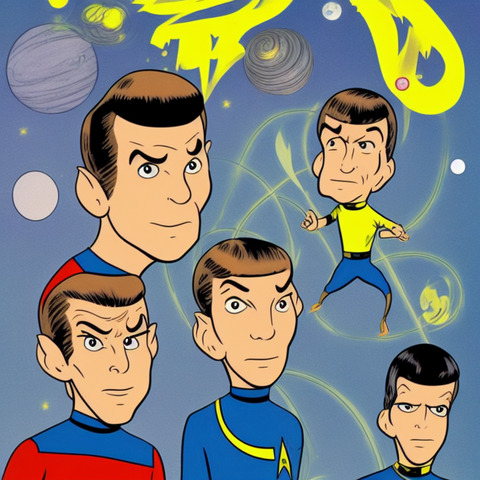Could AI art generators involve copyright violation?
Submitted by brad on Mon, 2022-09-19 11:29
Oh, the cases you'll know!

Oh, the cases you'll know!

Huge buzz has arisen over NFTs -- non-fungible-tokens -- due to the purchase of a token representing a piece of digital art by "Beeple" for over $69 million. Is it a craze, or does it make sense?
A new service called Red Carpet was announced, which will offer first-run movies in the homes of the very wealthy. You need a $15,000 DRM box and movie rentals are $1,500 to $3,000 per rental. That price is not a typo.
So I wrote an article pondering why that is, and why this could not be done at a price that ordinary people could afford, similar to the price of going to the movies.
Spokesmen for the MPAA, RIAA and several other content industry companies recently issued a statement of support for the new "Stop Airline Piracy Act" or SAPA, now before congress.
Yesterday, Don Henley (of the Eagles) penned an editorial in USA Today supporting the Protect IP Act (PIPA) which has serious free speech implications and turns web sites into copyright police. Don called out both the EFF (of which I am a Director) and Google (which is a consulting client of mine) so I have this whimsical response for him:
Over the years I have made two proposals for patent reform:
Last week, I posted a pointer to my parody of a famous clip from the movie Downfall and I hope you enjoyed it. While the EFF itself didn't make this video, I do chair the foundation and they posted a pointer to it on the "Deep Links" blog. All well and good.
Some time earlier, an iPhone app developer put together an iPhone app which would display the EFF blog feed. This wasn't an EFF effort, but the EFF gave them permission to put the logo in the app.
New Update, April 2010: Yes, even this parody video has been taken down though the YouTube Content-ID takedown system -- just as my version of Hitler says he is going to do at the end. I filed a dispute, and it seems that now you can watch it again on YouTube, at least until Constantin responds as well as on Vimeo. I have a new post about the takedown with more details. In addition, YouTube issued an official statement to which I responded.
Unless you've been under a rock, you have probably seen a parody clip that puts new subtitles on a scene of Hitler ranting and raving from the 2004 German movie Downfall (Der Untergang). Some of these videos have gathered millions of views, with Hitler complaining about how he's been banned from X-box live, or nobody wants to go to Burning Man, or his new camera sucks. The phenomenon even rated a New York Times article.
It eventually spawned meta-parodies, where Hitler would rant about how many Hitler videos were out on the internet, or how they sucked. I've seen at least 4 of these. Remarkably, one of them, called Hitler is a Meme was pulled from YouTube by the studio, presumably using a DMCA takedown. A few others have also been pulled, though many remain intact. (More on that later.)
Of course, I had to do my own. I hope, even if you've seen a score of these, that this one will still give you some laughs. If you are familiar with the issues of DRM, DMCA takedowns, and copyright wars, I can assure you based on the reviews of others that you will enjoy this quite a bit. Of course, as it criticises YouTube as well as the studio, I have put it on YouTube. But somehow I don't think they would be willing to try a takedown -- not on so obvious a fair use as this one, not on the chairman of the most noted legal foundation in the field. But it's fun to dare them.
(Shortly I may also provide the video in some higher quality locations. I do recommend you click on the "HQ" button if you have bandwidth.)
It's been a remarkably dramatic year at the EFF. We worked in a huge number of areas, acting on or participating in a lot of cases. The most famous is our ongoing battle over the warrantless wiretapping scandal, where we sued AT&T for helping the White House. As you probably know, we certainly got their attention, to the point that President Bush got the congress to pass a law granting immunity to the phone companies. We lost that battle, but our case still continues, as we're pushing to get that immunity declared unconstitutional.
Among many patent reform proposals it is common to have a desire for better examination, and more detection of prior art and obviousness. But the patent office only has so much money for so many examiners.
So here's a simple solution. If you want to apply for a patent, you must put in some time, as an expert in your field, examining other patent applications, searching for prior art and giving opinions on the obviousness. Alternately, this duty could be given only to those who actually are granted patents, to make more sure they are "skilled in the art" of their fields.
Many people feel there's a patent law crisis underway. The Patent office has been granting patents that either seem obvious, or aren't the sort of thing that should be patented. Some advance that software shouldn't be patentable at all, just as mathematics is not patentable.
I don't go that far, for reasons I will explain. But I have found a common thread in many of the bad patents which could be a litmus test for telling the bad from the good.
Patent law, as we know, requires inventions to be novel and not obvious to one skilled in the art.
Copyright © 2026, Brad Ideas
Designed by Zymphonies
